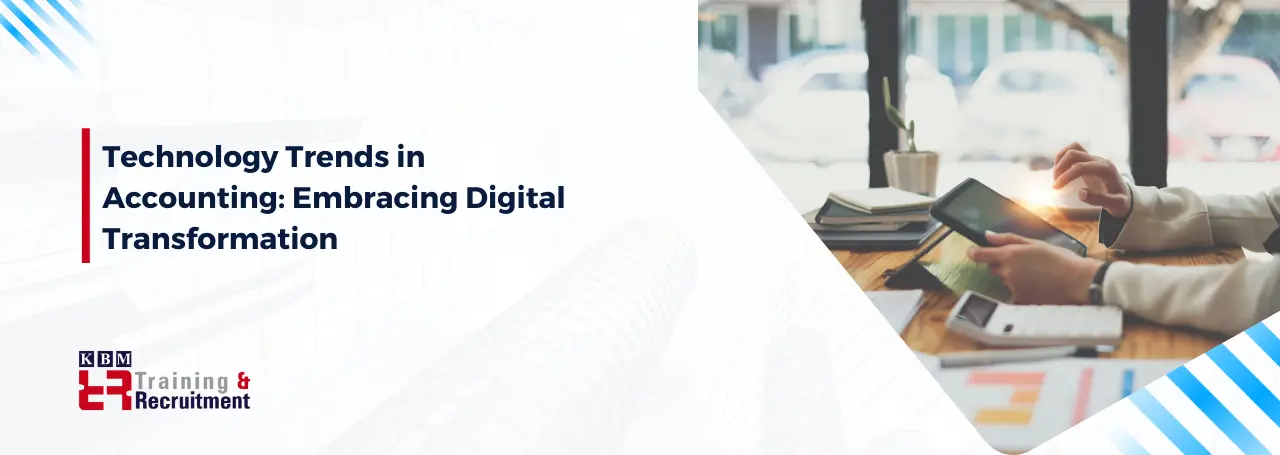In the ever-changing finance and accounting world, digital transformation is revolutionising traditional practices, leading to greater efficiency, accuracy, and strategic decision-making. The integration of advanced technologies is revolutionising how accountants and finance professionals operate, offering new opportunities for growth and innovation.
In this blog, we'll explore the key technology trends in accounting and how embracing digital transformation is becoming essential for success in the modern financial landscape.
The Evolution of Accounting Technology
- Cloud Computing: Cloud computing adoption has transformed the accounting landscape, allowing professionals to access data and applications from anywhere with an internet connection. Cloud-based accounting software streamlines collaboration, facilitates real-time updates, and ensures data security through encrypted platforms.
- Automation and AI: Automation and Artificial Intelligence (AI) are revolutionising routine tasks in accounting. Robotic Process Automation (RPA) automates repetitive processes, reducing the risk of human error and freeing up valuable time for accountants to work on strategic initiatives. AI-powered tools analyse data trends, predict financial outcomes, and enhance decision-making.
- Blockchain Technology: Blockchain is gaining prominence in accounting for its role in ensuring transparency, security, and accuracy in financial transactions. Its decentralised nature eliminates the need for intermediaries, minimising the risk of fraud and creating a tamper-proof ledger. Blockchain is particularly valuable for enhancing the integrity of audit trails and validating financial information.
- Data Analytics: The rise of big data has paved the way for advanced data analytics in accounting. Analysing vast datasets provides valuable insights into financial trends, enabling accountants to make data-driven decisions. Predictive analytics helps forecast future financial scenarios, contributing to strategic planning and risk management.
Artificial Intelligence and Machine Learning
AI and machine learning are transforming accounting by automating routine tasks, predicting financial patterns, and enhancing fraud detection. Intelligent systems can learn from historical data, improving accuracy in financial reporting and enabling accountants to focus on complex analyses and strategic planning.
Cloud-Based Accounting Software
Cloud-based accounting solutions offer flexibility, scalability, and real-time collaboration. Accountants can access financial data securely, collaborate with team members, and provide clients with instant updates. This trend promotes efficiency, reduces reliance on physical infrastructure, and facilitates seamless remote work.
Blockchain for Financial Transactions
Blockchain technology ensures the robust security and transparency of financial transactions. It provides an immutable and decentralised ledger that enhances the accuracy of financial records. This trend is particularly relevant for businesses looking to streamline audits, strengthen trust, and reduce the risk of fraudulent activities.
Automated Financial Reporting
Automation in financial reporting expedites the generation of accurate and compliant financial statements. Automated reporting tools can extract data from various sources, standardise formats, and create reports with minimal manual intervention. This trend minimises errors, enhances consistency, and accelerates the reporting cycle.
Cybersecurity Measures
As technology adoption enhances, so does the importance of robust cybersecurity measures. Protecting financial data from cyber threats is a top priority. Accountants implement multi-layered security protocols, encryption techniques, and regular cybersecurity audits to safeguard sensitive financial information.
Mobile Accounting Apps
The widespread use of mobile devices has spurred the development of mobile accounting apps. These apps allow accountants and finance professionals to manage tasks on the go, providing real-time access to financial data, expense tracking, and collaboration features. Mobile accounting apps enhance flexibility and responsiveness.
Embracing Digital Transformation in Accounting:
- Continuous Learning: Accounting professionals should embrace a culture of constant learning to stay abreast of technological advancements. Participating in training programmes and webinars and earning certifications in emerging technologies ensures that professionals remain competitive. It harnesses the full potential of digital tools.
- Collaboration and Integration: Achieving successful digital transformation in accounting necessitates seamless collaboration and integration of technologies. Cloud-based platforms that seamlessly integrate with various applications, such as enterprise resource planning (ERP) and customer relationship management (CRM) and systems, enhance overall efficiency and data accuracy.
- Data Security Prioritisation: As technology evolves, so do the threats to data security. Accountants must prioritise robust cybersecurity measures, including secure cloud hosting, encryption, and regular security audits. Ensuring compliance with data protection legislation is vital to safeguard sensitive financial information.
- Strategic Planning for Implementation: Digital transformation should be approached strategically. Accountants should assess their needs, evaluate available technologies, and develop a phased implementation plan. This approach ensures a smooth transition, minimises disruptions, and allows for the gradual adoption of new technologies.
- Client Education: Accountants play a crucial role in educating clients about the benefits of digital transformation. Clients should understand the value of automated processes, real-time collaboration, and the enhanced security provided by advanced accounting technologies. Client education fosters a collaborative and tech-savvy financial ecosystem.
Integration of Virtual and Augmented Reality
Including virtual and augmented reality technologies is a prospective future trend in accounting. These technologies could provide immersive experiences for financial analysis, training simulations, and virtual meetings, fostering enhanced collaboration and decision-making.
Advanced Predictive Analytics
The evolution of predictive analytics is expected to continue, enabling accountants to forecast financial trends with greater accuracy. Advanced analytics models may incorporate machine learning algorithms, allowing for more nuanced predictions and scenario planning.
Enhanced Regulatory Compliance Tools
As regulatory requirements evolve, accounting technologies will likely feature enhanced compliance tools. Automated compliance checks, real-time updates on regulatory changes, and streamlined reporting processes will be integral to ensuring adherence to ever-changing financial regulations.
Conclusion
Embracing digital transformation in accounting is not just necessary; it's a strategic imperative for staying competitive in the modern financial landscape. By leveraging emerging technologies, accountants can streamline processes, enhance data accuracy, and focus on strategic decision-making.
The trends outlined in this blog underscore the transformative potential of digital tools in accounting, shaping the future of financial management and reporting. As technology advances, accountants who proactively embrace these trends will position themselves as leaders in the digital era of accounting.






















